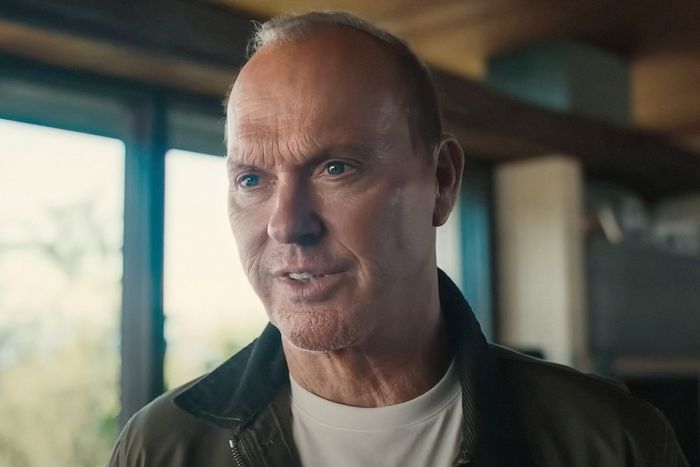
People do a lot of apologizing to Andy Goodrich, the gallery owner played by Michael Keaton in Goodrich, which is strange given that the premise of the movie rests on what a fuckup he is. Andy is so oblivious about what’s going on at home that when his wife calls him in the middle of the night to tell him that she has checked herself into rehab, he’s as shocked to discover that she isn’t asleep in bed next to him as he is to learn she’s been struggling with a pill addiction. As a father, Andy has been a genially absentee dad for two generations of kids. He’s now on friendly terms with his elder daughter from his first marriage, Grace (Mila Kunis), but approaches his promotion to primary caretaker of the precocious 9-year-old twins from his second with the cluelessness of someone disengaged enough to forget that one of the pair has a nut allergy. Andy lives for the boutique art gallery that bears his name, though that too is failing, saddled with loans and unable to make rent, its artists fleeing after shows that fail to move a single piece. When his assistant quits to take what is undeniably a better gig, the 20-something nevertheless says “sorry,” as though he had some obligation to his boss to go down with the ship.
Andy is, according to writer-director Hallie Meyers-Shyer, inspired by her complicated feelings about her dad, fellow filmmaker Charles Shyer, who remarried after his divorce from her mother, Nancy Meyers, and had two children with his third wife. Not all movies benefit from biographical readings, but this insight really unlocks Goodrich, which feels like the midpoint of working through something in therapy. Goodrich wants to present its eponymous hero as lovably flawed, one of those charismatic forces of nature whose presence makes the world better, even if it comes at the expense of those closest to them. But underneath, it’s incredibly angry at its main character despite all its attempts to make peace with him as he is. When, late in the movie, Grace blows up at her father after he forgets that he promised to take her to a doctor’s appointment, it’s a raw moment of honesty about the rage she has felt while watching him step up for her much younger half-siblings, given how little he was around when she was a child. Then, of course, she apologizes — not for what she said but for saying it to him, as though she were breaking some unspoken pact everyone agreed to before the start of the movie.
All those “sorry”s feel like a symptom of Goodrich’s desire to keep things light, to present itself as a comedic story about a man’s late midlife crisis instead of one about the resentment of the women around him. Meyers-Shyer is the child of a pair of hit Hollywood directors and has now made two features that attempt to follow in those footsteps but come from a place that’s genuinely alien. There’s a gleaming, unapologetically aspirational quality to the work that Meyers, in particular, is famous for and that Meyers-Shyer appears to be striving to emulate in both this film and her 2017 directorial debut, Home Again, which her mother produced. But Meyers-Shyer doesn’t actually pause to appreciate the sumptuousness of the carefully decorated house Andy lives in, or the art that is his all-consuming passion but that the camera barely spares the time to take in, or even the dinners he is constantly leaving his children behind to attend. Watching Goodrich isn’t like playing tourist in an upscale world — it’s more like stepping into the head of someone whose sense of normal is wildly different from your own. Grace at one point describes her father’s life as bohemian, a bewildering statement given that the film makes him seem like a standard-issue rich workaholic.
Goodrich needs its protagonist to charm, and Keaton can definitely do charming. One of his best moments, early on, finds him driving to his wife’s treatment center despite her express wishes that he stay away, his face blissfully and amusingly unconcerned as piano music plinks in the background. But Andy just isn’t that compelling of a character — not in a way that would explain why so many of the people in his life feel the need to accommodate his foibles and continually accept him as he is rather than wanting him to change. He’s less an endearing relic than someone who seems to have existed in a bubble for decades, one that extends far beyond his own self-centeredness. For someone who has supposedly come up in the art world, Andy sure is inexplicably perplexed by the idea of rehab, and by the gay dad (Michael Urie) he befriends at the twins’ school, and by the woo-woo leanings of the singer (Carmen Ejogo) he approaches in hopes of being able to handle her artist mother’s estate. By the time the movie attempts to extend some pathos in Andy’s direction, suggesting that he’s starting to realize the inherent loneliness of his choices, the character has fallen apart. Goodrich ends where it feels like it should have begun, with a sidelined Grace telling him how she really feels — which is a start but doesn’t exactly offer the audience the same level of catharsis. Maybe in the next session!
More Movie Reviews
- The Accountant 2 Can Not Be Taken Seriously
- Another Simple Favor Is So Fun, Until It Gets So Dumb
- Errol Morris Has Been Sucked Into the Gaping Maw of True Crime


